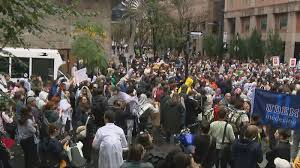Protests Erupt at Concordia University: A Student Response to Social Issues

Introduction
The recent protests at Concordia University have garnered significant attention and sparked discussions about critical social issues, including climate change, tuition fees, and systemic racism. These demonstrations underscore the power of student activism, as university students mobilize to address pressing concerns both locally and globally. Understanding the motivations and implications of these protests is crucial for appreciating the evolving landscape of higher education and social justice in Canada.
Details of the Protests
In early October 2023, thousands of students took to the streets near the university’s downtown campus in Montreal. Organizers cited frustrations over rising tuition fees, which have become increasingly burdensome for students from diverse socioeconomic backgrounds. The protests were also fueled by a growing concern over climate change policies, demanding that the university take more definitive actions toward sustainability and ethical investments.
Participants were seen holding banners, chanting slogans, and calling for the university administration to address their demands. Student leaders expressed that the protests were not only a call for action but also a response to what they perceive as a lack of engagement from the administration regarding student welfare and social justice initiatives.
Broader Context and Reactions
The protests reflect a broader movement among university students across Canada, echoing similar sentiments expressed in various institutions nationwide. With the cost of education rising and the financial strain increasingly felt by many students, solidarity has grown among groups advocating for equitable access to education. The immediate response from the Concordia administration has been cautious, with statements emphasizing their commitment to dialogue with students and stakeholders.
Moreover, local activists and community organizations have also expressed solidarity with the students, highlighting how these issues transcend campus boundaries and resonate with wider societal challenges. Public support for the protests shows the potential for a unified front in tackling systemic issues affecting students.
Conclusion
The ongoing protests at Concordia University serve as a reminder of the power of student activism in shaping discussions on important social and economic issues. As the university community navigates these challenges, experts suggest that increased dialogue and actions from administration could pave the way for meaningful change. Looking ahead, it is essential for both students and administrations to engage constructively in addressing these pressing issues. Ultimately, the significance of the Concordia protests extends beyond the campus, highlighting a generation’s commitment to creating a fairer and more just society.









